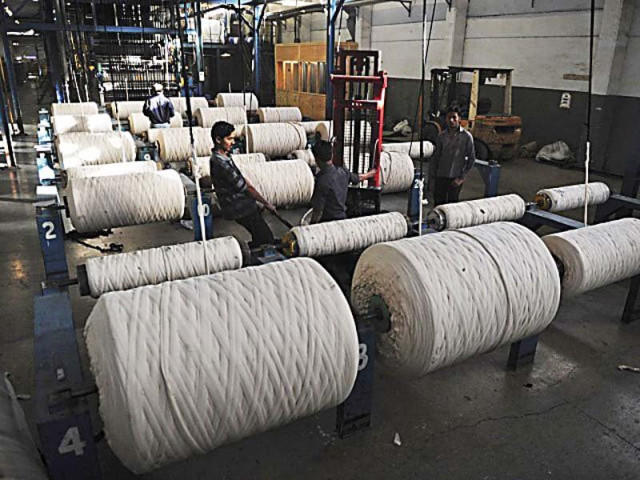Power for industrial sector: ‘PM’s order did not imply denying fuel adjustment revision’
As oil prices go down, APTMA official says further tariff cut needed

Spinning units would be able to resume production once the tariff relief kicks in, said the official. PHOTO: FILE
Prime Minister Nawaz Sharif announced a cut in power tariff for the industrial sector with effect from January 1. With declining prices of crude oil, the industry expected to derive further benefit.
Fuel prices may be slashed by 17%
However, when the power regulator announced the cut, there was no mention of fuel adjustment charges being revised downwards, ruffling feathers in the industrial sector that expected dual benefit.
Addressing a press conference, Fayyaz said that fuel adjustment is granted to every consumer. “When fuel prices increase, the tariff is adjusted upward and it is reflected in every bill.
“The tariff relief granted by the Prime Minister cannot be nullified by denying monthly fuel charges adjustment when cost of power production has declined due to low fuel prices.”
The official also drew attention towards the textile package promised by the commerce and finance ministers and demanded its immediate release.
He said that the 110 spinning units have been shut down and would be able to resume production once the tariff relief announced by the government is brought into effect. “Exports have declined by over 14% in the last six months - that is ample proof that Pakistan has lost its competitive edge.
OGRA approves gas price increase
“Textile industry, especially in Punjab, is already facing issue of declining orders and if the situation persists in the current fiscal year the textile industry could lose its export revenue of $3.5 billion.
“Government is taking loans to cover its deficit, however, the textile industry has the potential to generate sufficient foreign exchange only if it is provided with proper supply of energy.”
Load-shedding is one of the main reasons for the decline in GDP with the industrial sector crippled due to persistent power woes. The ruling PML-N has promised addressing the concerns, but so far little improvement has been achieved.
“Currently, textile mills in Punjab are receiving six hours of gas supply which is not sufficient even to operate one shift.
“The industry needs at least 16 hours of supply to meet the demands of international clients.”
OGRA proposes slashing fuel prices
The official added that there was some hope in the form of a recently-signed LNG deal.
“LNG converted to gas could be available at much cheaper rates; it may ease some pressure from the industry in coming months.”
Published in The Express Tribune, February 13th, 2016.
Like Business on Facebook, follow @TribuneBiz on Twitter to stay informed and join in the conversation.



















COMMENTS
Comments are moderated and generally will be posted if they are on-topic and not abusive.
For more information, please see our Comments FAQ